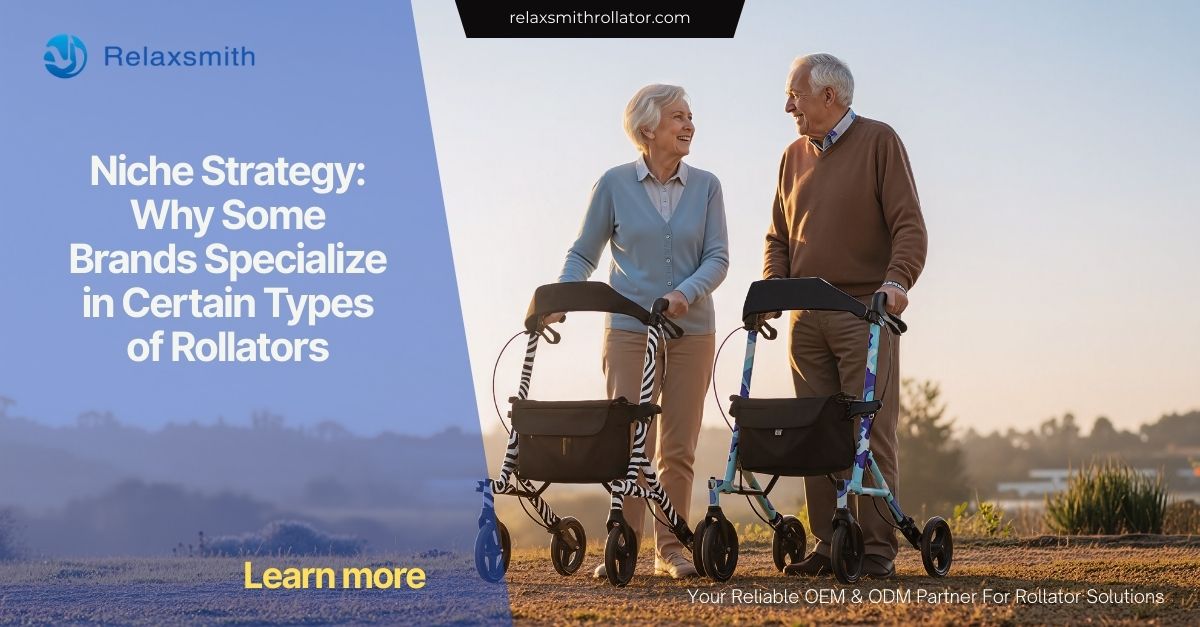Niche Strategy: Why Some Brands Specialize in Certain Types of Rollators

In the crowded mobility aid market, many product managers and procurement specialists notice that some brands offer an extremely broad range of rollators, while others focus tightly on specific models or features. One frequently asked question is: Why do some brands specialize in certain types of rollators? Understanding this strategy reveals insights about cost, innovation, user focus, and supply chain control.
1. Market Differentiation & Brand Identity
Brands that specialize in certain types of rollators often use niche positioning as a way to stand out. For example, a company might focus solely on lightweight rollators for travel or ultralight folding rollators for urban use. Another might specialize in heavy-duty or bariatric rollators designed for higher weight capacities. By doing so, they build expertise, strong user trust, and reputational strength in those segments. For procurement, choosing a brand that truly knows its segment usually means fewer compromises, better component sourcing, and higher functional reliability.
2. Cost and Manufacturing Efficiency
Manufacturing rollators involves tooling, parts inventory, QA/ QC, and regulatory compliance. If a brand tries to cover many different types, from ultralight travel frames to off-road models, it must maintain many different molds, multiple material suppliers, and diverse compliance testing. Brands that specialize in certain types of rollators reduce complexity. They can standardize components, negotiate better with suppliers for volume in specific parts, and streamline testing. That leads to cost savings and often better profit margins—qualities that procurement managers should look for when comparing proposals.
3. Optimizing for Specific User Needs
User needs vary dramatically: a senior who walks only indoors may prioritize seat comfort, stability, lightweight, and easy maneuvering. A rehab patient may need adjustable height, robust brakes, foldability, and easy transferability. An outdoor user may need large wheels and weather-resistant finishes. Brands that specialize in certain types of rollators tend to align their R&D, materials, and design processes around those user profiles. That gives them an advantage in meeting specific expectations—fewer trade-offs and greater user satisfaction.
4. Regulatory Compliance and Safety Standards
Regulatory requirements differ by type: weight capacity, stability, braking performance, durability under cycles of folding or impacts, corrosion resistance, etc. Brands that spread across many types must satisfy many different standards. Those that specialize can focus on passing tests relevant only to their chosen types, thereby ensuring deeper compliance and fewer failures. For procurement, selecting brands with strong test credentials in your needed rollator category (outdoor use, bariatric, travel, etc.) is lower risk.
5. Innovation and Deep Expertise
When a brand focuses, its engineers and product teams accumulate specialized knowledge—about joint fatigue, lightweight materials, fold mechanisms, or weather sealing—that generic or broad-range brands may not develop as deeply. Specialization fosters incremental design improvements, better field feedback feedback loops, and product refinements that generalist brands might overlook. This helps explain why some brands specialize in certain types of rollators: specialization can be a source of competitive innovation.
6. Implications for Procurement & Supply Chain Strategy
Procurement managers should consider whether to partner with specialized brands or with generalists. Specialized brands may offer better feature sets, more refined design, higher component quality—but possibly less flexibility or higher minimum order quantities. Supply chain must assess capacity, lead times, spare-parts availability, and whether specialized materials cost more. Also, specialization may mean more dependency risk if a brand handles only one niche. Balancing these factors is crucial to making informed decisions.
7. Conclusion
In conclusion, brands choose specialization for strategic reasons: differentiation, manufacturing efficiency, regulatory compliance, innovation, and alignment with user needs. For product managers and procurement teams, understanding why some brands specialize in certain types of rollators helps in evaluation, risk assessment, and supplier selection. It allows you to favor companies that are deeply capable in your required type rather than jack-of-all-trades. When you understand their niche strategy, you make smarter investments and better product choices.












